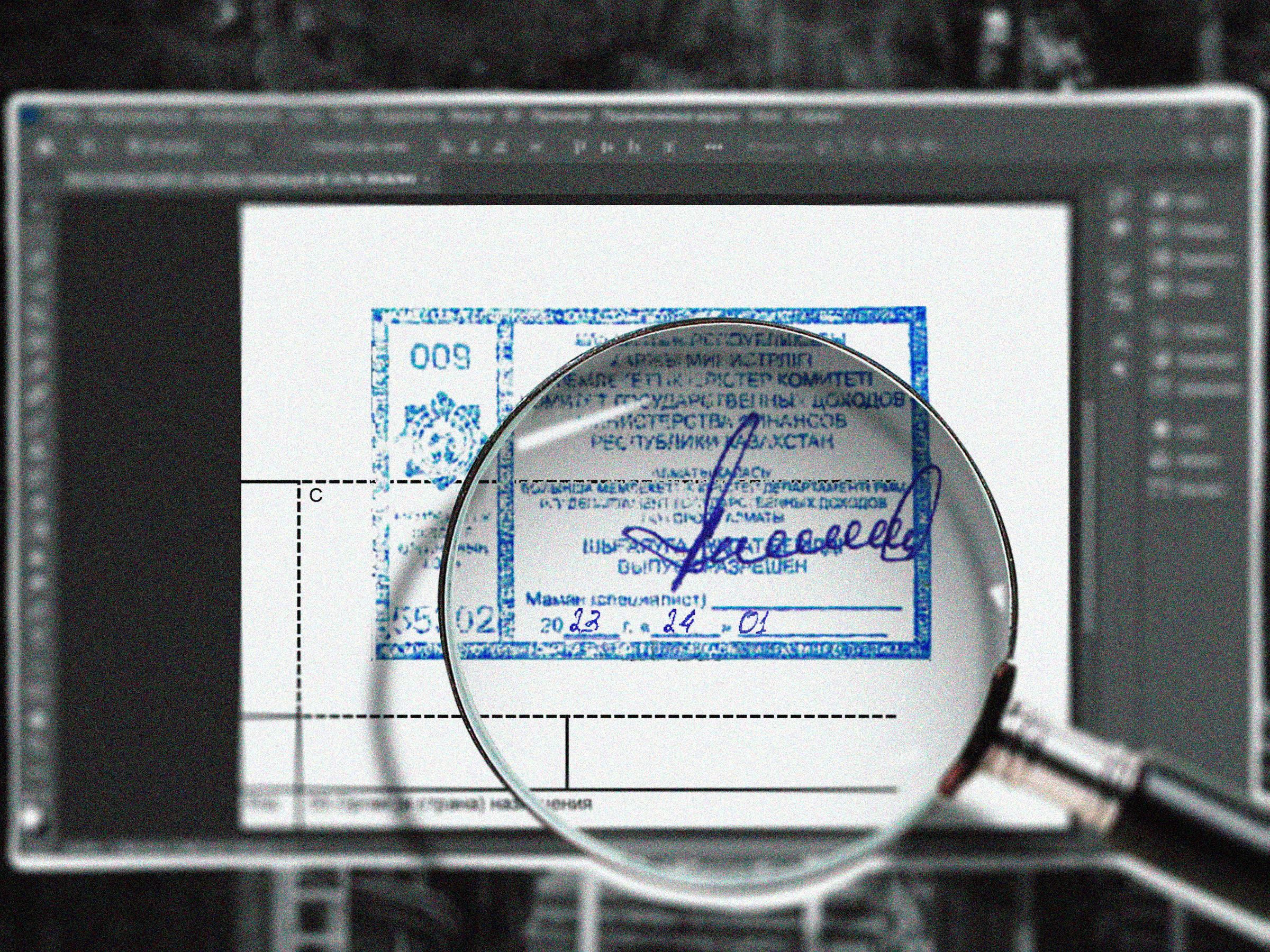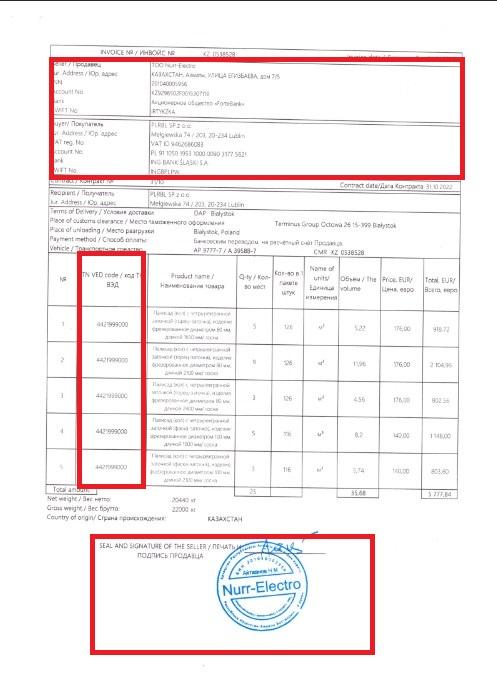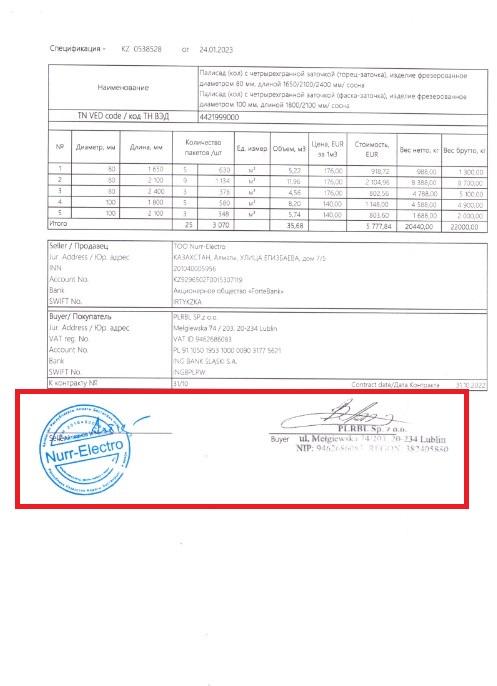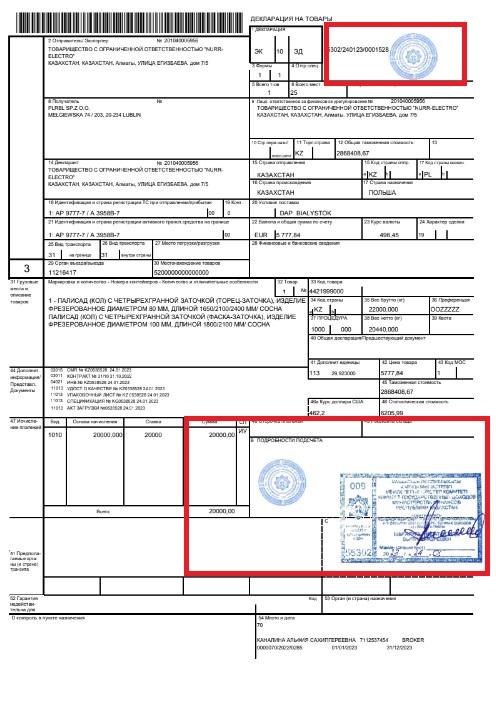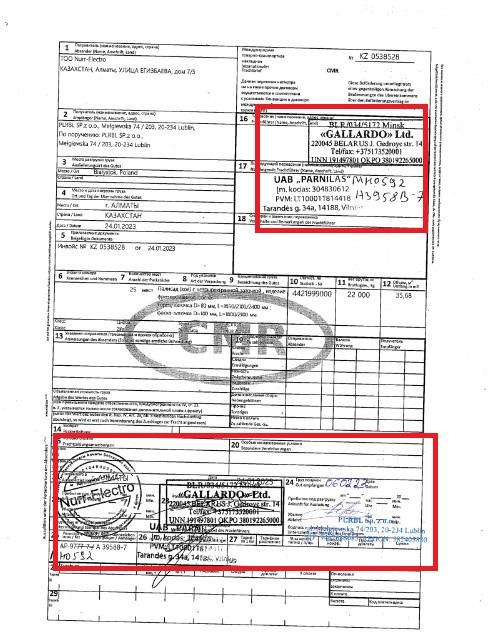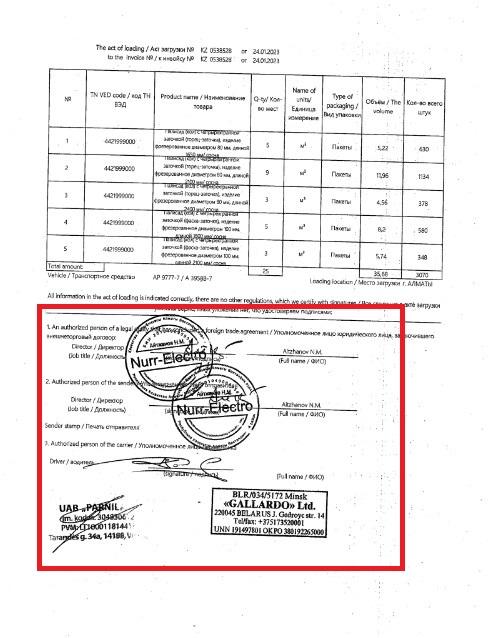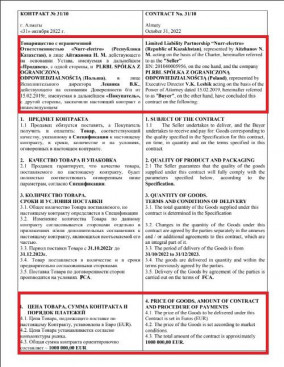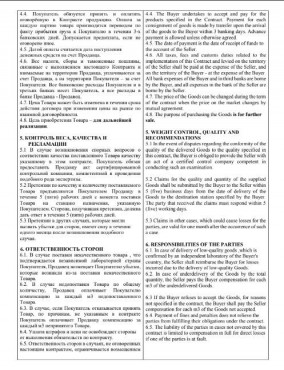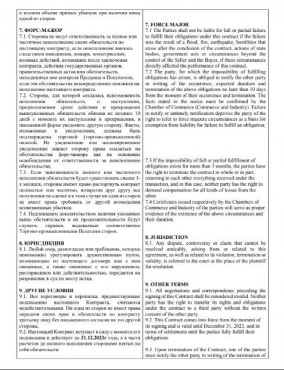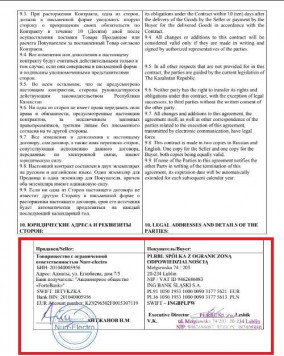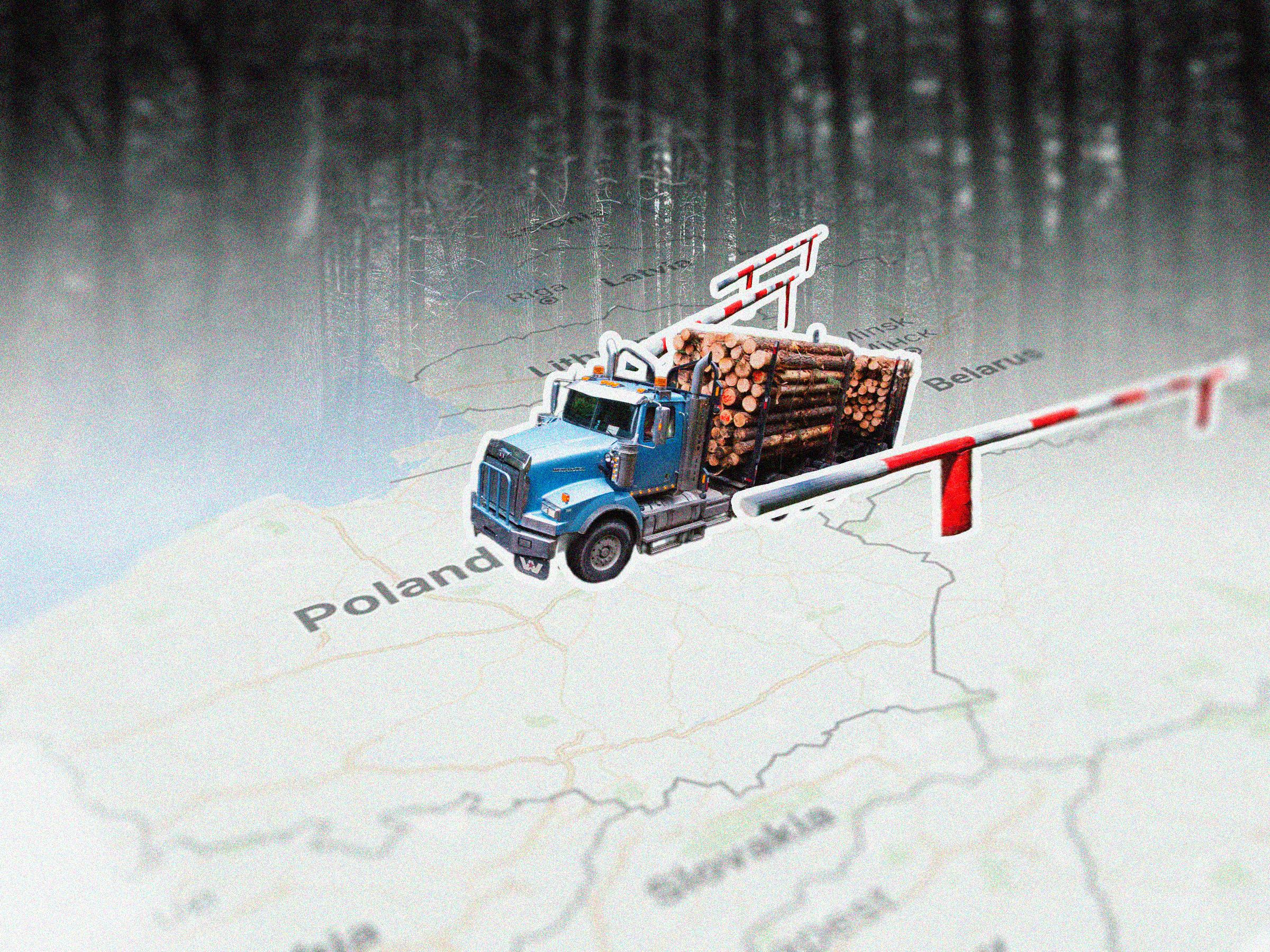This story was created in collaboration with the Polish newspaper Gazeta Wyborcza and Skhemy, a project of the Radio Liberty Ukraine office, with the support of the activist group CyberPartisans.
BIC investigators found a new method being used to bypass sanctions that forbid the import of Belarusian timber to the EU. The restrictions went into effect in June 2022. In December of 2022, we uncovered a scheme using false documents. We became interested in this topic due to a significant increase in imports to the EU. Imports from Kazakhstan have increased 74-fold, while imports from Kyrgyzstan have risen by about 18,000 times. Some of it is Belarusian timber, exported to Europe through indirect re-export schemes.
Our new investigation showed that the EU border is still open for restricted Belarusian goods. BIC was provided with more than 40 supply contracts worth millions of euros. This is despite the fact that, since our last article, the EU has stepped up customs controls, discussed the issue with Central Asian countries, and partially closed the smuggling route. Imports of timber allegedly originating from Kyrgyzstan to Europe in 2023 were down by almost 50 percent. But there was little change in the supplies from Kazakhstan.
Explosive imports
Imports of wood from Kazakhstan to the EU for 2022 and 2023 show explosive growth to a record of almost 126 million euros. Based on the documents we have, Kazakhstan is a supplier of wood and wood products as well as charcoal.
These are products classified as HS Code 44. Before the introduction of sanctions on Belarusian timber, Kazakhstan had minimal involvement in such trade, while Belarus exported timber worth around one billion euros annually.
The largest share of deliveries to the EU goes through Poland. Imports into Poland increased almost fivefold last year compared to 2022, from €14 million to almost €68 million.
The Polish Chamber of Commerce and Industry for the Wood Industry has also noted a significant increase in timber imports from Kazakhstan over the past two years. This could indicate that Russia and Belarus are circumventing the sanctions, said Piotr Garstka, a spokesman for the agency, in a comment to our colleagues at Gazeta Wyborcza. He gave the example of plywood. Kazakhstan had never produced plywood before, but in two years it had become a major supplier.
"Our member companies have reported receiving offers for wood products at abnormally low prices. Or for species indicating Russian origin, such as Siberian larch. When we learned of successful tenders for the supply of converted timber to state-owned companies at abnormally low prices (even below the cost of raw materials!), we appealed to the Ministry of State Property to take appropriate corrective measures, but we have yet to receive a response," Garstka said.
In 2023, Kazakhstan exported €11 million worth of wood to Latvia, three times more than the previous year's imports of €3.5 million. In Lithuania, the totals were €10 million in 2022 and €5.5 million in 2023. In years before that, the amounts were insignificant. This is happening even though Kazakhstan itself has to import timber, most of which comes from Belarus and Russia. Kazakhstan’s forest cover is only 5% of its total area. Half of these forests are bushy saxaul trees. In 2022, Kazakhstan banned the export of some types of timber. The restriction is still in effect today.
Forged documents
Sources in the forest products industry provided BIC with documents that were likely forged. If their falseness is confirmed, it means that at least some of Kazakhstan's shipments to the EU involves the smuggling of Belarus timber that is under sanctions.
The documents show that palisades often used for fencing were shipped from Kazakhstan to Europe in February 2023. This transaction was part of a shipment worth around one million euros. These documents bear the seals of the supplying Kazakh company Nurr-Electro and the receiving Polish company PLRBL. At the time of preparing this material, Nurr-Electro has released information about its liquidation to the media.
The seals on the consignment note were forged and there was no transaction, Nurr-Electro lawyer Arman Tuliyevich told BIC: "There were no financial means for the transaction, let alone the goods. Therefore, no money, no deal." He also said that the company did not supply wood to the Polish company PLRBL.
Vital Leshik, former executive director of PLRBL, also confirmed the forgery. It is his signature on the documents. Leshik told BIC he had not signed the papers. He said that he plans to contact the Polish police to determine the origin of the consignment notes and contracts we have obtained.
To verify the statements made by the representatives of the two companies appearing in the documents, we asked impartial graphic design professionals to evaluate the authenticity of the papers.
"It (the Nurr-Electro seal) is an unequivocal fake. The seal appears to have been scanned and cut from another document, as indicated by the dot pattern around the letters. The original seal should not display such characteristics. The same goes for (PLRBL executive director Vital Leshik's) signature. The dot pattern is irregular. It is taken from a scanned document and inserted here using Photoshop", explained Vladimir, a designer (name changed for safety reasons).
His colleague Dmitry (name changed for safety reasons) also confirmed the forgery of seals and signatures:
"We observe a complete match – as alike as two peas. Despite one's best efforts, achieving perfectly even seal impression throughout the document is nearly impossible. Even the slightest error in inclination or angle can result in noticeable differences. It is a poor forgery."
Our graphic design experts also stated that the seal on the consignment note from the State Revenue Committee of the Ministry of Finance of the Republic of Kazakhstan is forged. "At a zoom rate of 220%, the seal is entirely illegible. If it were a [genuine] stamp, it would have been slightly inclined and the impression would have been imperfect in some way. It's 100% fake," Dmitry said.
This may suggest the goods were not exported from Kazakhstan. This is supported by the fact that we did not find any record of such a shipment in the export database.
The carrier in the documents we have received is the Belarusian company OOO Gallardo. According to the consignment notes, it was this company that brought the palisade into Europe. We contacted OOO Gallardo, posing as an employee of the Polish company PLRBL, to find out the details of the shipment.
"We did not carry it (the timber) from Kazakhstan. We carried it from Belarus; this was where the trucks were loaded. We used the documents that were presented to us. That's it. It is what it is. We did an honest job, we did not go to Kazakhstan, and it wasn't us who drew up these documents," explained a Gallardo employee.
He mentioned the Belarus-based company OOO SO RBL. We have reason to believe that the timber was shipped out this company’s warehouse in Belarus. It specializes in sawing, planing and adding chemicals to wood. Aleh Yanovich is the sole owner of the company. He is also the president of the Polish company PLRBL, which was supposed to receive the palisades purportedly originating from Kazakhstan. [*] [*] [*]
BIC contacted Yanovich. He responded that we had "false information" and that he was not employed in Poland. He refused to answer other questions:
"Do you realize at all what you're asking me? I don't understand. Are we friends or something? Or maybe you're my mistress or a family member? Do you realize the nature of the questions you ask me?"
Kyrgyzstan enters the stage again
In 2023, the Polish company PLRBL signed contracts to supply the EU with timber believed to be of Belarusian origin, disguised as goods of Kyrgyz origin. We possess 2023 documents, but they do not specify the products of the transaction. However, similar contracts and invoices related to them for the year 2022, which we have also obtained from sources in the forest products industry, do include timber. The goods are indicated as originating from Kyrgyzstan and PLRBL is listed as the recipient. The approximate value of the deals is around €15 million.
Deliveries under these contracts for 2022-2023 covered a number of countries, including Poland, Lithuania, Latvia, Slovenia, Hungary, France, Germany, Belgium, the Czech Republic and Estonia. This is despite the fact that Lithuania has almost completely blocked the import of Belarusian wood from Kyrgyzstan. Imports to Latvia dropped almost 7.5 times from €2 million in 2022 to €273 thousand in 2023. But for two years in a row, timber supplies from Kyrgyzstan to Poland amounted to around €1.2 million a year. In 2021 there were none at all.
Intermediary companies may have been involved in the transactions, which look like schemes to circumvent restrictions on Belarusian timber. For example, In December 2022, PLRBL signed a contract with Kyrgyz company Dezis. A month later, in January 2023, they sold goods to Lithuanian JSC Etoris. [*] [*]
PLRBL purchased goods from the Polish company Pelina Pavel Bisliuk in February and March 2023. Pelina Pavel Bisliuk also sourced products from Kyrgyz company Dezis. Pavel Bisliuk is the director of both Lithuanian JSC Etoris and Polish company Pelina Pavel Bisliuk. In almost all invoices for timber supplies from Polish PLRBL to other European companies, Kyrgyzstan is listed as the origin country of the wood. [*] [*] [*] [*]
BIC also discovered forgery among these transaction documents. Our graphic design experts analyzed a contract with Lithuanian JSC Etoris. They found that the signature of former PLRBL executive director Vital Leshik had been forged. Leshyk insists he did not sign any of these agreements.
We also discovered the Polish company Pelina Pavel Bisliuk had already breached sanctions laws. In 2023, Kazfanera, a Kazakhstan-based company, used the services of Pelina Pavel Bisliuk to supply plywood from Russia to Poland. Russian plywood is banned from import into the EU.
Yeset Aitzhanov is the head of both Kazfanera and the above-mentioned Nurr-Electro. Pelina Pavel Bisliuk also supplied plywood products to Belgium. We found information on shipments in the World Export Database. [*] [*] [*] [*] [*] [*]
OOO ChRK-Bishkek is a partner in PLRBL deals. BIC has identified OOO ChRK-Bishkek as a potential supplier of restricted timber to the EU. It is listed in a 2022 supply contract deal worth €500,000. [*] [*] [*]
Usevalad Liabetski, a former Belarusian military officer, owns ChRK-Bishkek. He also has a company in Belarus, OOO ChRK-Group. It deals in aviation spare parts, parts for rescue vehicles and other equipment, including MT-LB combat vehicles and GT-T and GT-S tractors with tracks. It is a distributor for Limbach, a manufacturer of engines for aircraft and UAVs. [*] [*] [*] [*] [*] [*]
Customs can't control it all
We found that the Polish company PLRBL is likely supplying timber under the guise of Kazakh and Kyrgyz timber. The first EU country to which this product is unloaded is Poland in at least one of the transactions. Forged documents allowed the timber to cross the EU border.
We have requested an inspection of the Polish company PLRBL and its owners by the Ministry of Internal Affairs, Border Guard Service, Ministry of Foreign Affairs, and Customs Service (operating under the Ministry of Finance) of Poland. We also asked about the process for verifying invoices at the border for forgery and if there are plans to simplify adding new companies and individuals to the sanctions lists.
The Poland Foreign Ministry and Border Guard Service responded that the issue of circumventing sanctions was not within their competence. The Customs Service gave a detailed response, which boils down to a few key points:
- information on audits falls under tax secrecy;
- the Polish customs authorities do not have the physical capacity to verify all customs declarations and invoices, and in general, the EU is moving towards electronic rather than paper-based document control;
- the sanctions lists are drawn up by the Polish Interior Ministry; this procedure can only be simplified by a change in the law, which the Customs Service cannot influence.
Poland's Interior Ministry has launched a probe but has so far refrained from commenting.
Our colleagues at Gazeta Wyborcza received a comment from Daria Gosek-Popiołek, deputy chair of the Polish Committee for Environmental Protection, Natural Resources and Forestry:
"The case uncovered by journalists shows how easy it is to circumvent sanctions. However, this should not be the task of the journalists, but of the agencies in charge. Together with [Maciej] Konieczny, a member of the Sejm, we will contact the Ministry of the Interior and the Administration to review the procedures related to the sanctions. We need to make sure that the rules are strictly enforced and that the border is sealed when it comes to the transport of sanctioned goods".
BIC also sent inquiries to the Ministry of Internal Affairs and the Customs Department of the Lithuanian Ministry of Finance. We were told that they have started an investigation. We have not yet received a response to our inquiries to the State Revenue Committee under the Ministry of Finance of the Rebublic of Kazakhstan.



